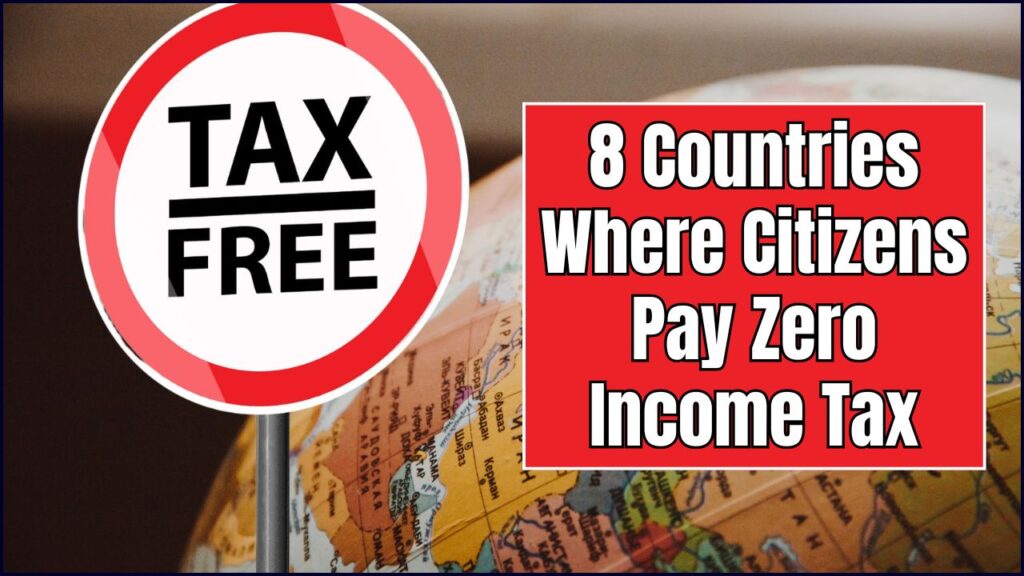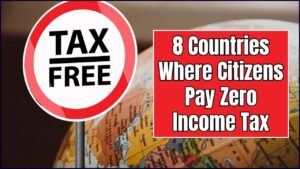As countries adjust fiscal strategies in Budget 2025, several continue to stand out for maintaining zero personal income tax. These eight nations use alternative revenue models—such as tourism, oil, and consumption taxes—to fund public services, making them unique economic case studies amid global tax reforms.

Understanding the Zero Income Tax Model in 2025
Countries with no personal income tax do not tax individuals on salaries, dividends, or capital gains. However, this absence does not imply a lack of government revenue. Instead, these countries rely on other mechanisms—such as value-added tax (VAT), resource exports, and licensing fees—to support infrastructure, education, and public health.
According to the International Monetary Fund (IMF), such models are viable primarily in economies with abundant natural resources or robust tourism sectors, which offer consistent revenue without taxing individual earnings.
The 8 Countries with No Personal Income Tax in Budget 2025
1. United Arab Emirates (UAE)
The UAE remains a zero-income-tax jurisdiction for individuals, although a federal corporate tax of 9% applies to business profits exceeding AED 375,000. VAT at 5% contributes to national revenue. Government programmes like the Golden Visa aim to attract high-skilled professionals and investors.
“The UAE’s fiscal stability is underpinned by oil exports and increasingly diversified revenue,” said Dr. Reem Al Hashimy, Minister of State for International Cooperation, during a 2025 economic briefing.
2. Qatar
Qatar imposes no personal income tax and maintains a 10% corporate tax on most domestic business activities. The state’s sovereign wealth fund, backed by liquefied natural gas (LNG) exports, underwrites extensive public infrastructure and welfare programmes.
Qatar continues to expand visa-free access and residency options for skilled expatriates.
3. The Bahamas
The Bahamas enforces no income tax, capital gains tax, or inheritance tax. Instead, it collects government revenue through VAT (10%), customs duties, and real estate transfer taxes. The country’s economic resilience is largely attributed to its tourism industry and offshore financial services sector.
To qualify for tax residency, foreign nationals must spend at least 90 days annually in the country and own residential property.
4. Bermuda
Bermuda has no personal income tax, but imposes payroll taxes on employers, as well as customs duties and land taxes. The territory maintains a stable fiscal environment with high per-capita GDP, supported by international insurance and reinsurance services.
5. Monaco
Monaco offers zero income tax to residents, except for French citizens due to a bilateral agreement. The city-state generates revenue via VAT, corporate taxes, and tourism. Its real estate market is among the most expensive globally, with property often a prerequisite for residency.
Monaco is under scrutiny from the Financial Action Task Force (FATF) for enhancing transparency in financial transactions.
6. Vanuatu
Vanuatu has no personal or corporate income taxes. It funds public services through import duties, VAT (15%), and licensing fees. The country’s Citizenship by Investment programme has attracted global investors, though it has faced regulatory criticism from the European Union regarding due diligence standards.
7. St. Kitts and Nevis
This Caribbean twin-island federation levies no income tax, and instead depends on tourism, citizenship investment schemes, and corporate registration fees. The minimum investment for a passport is US$250,000, with residency pathways also available for long-term relocation.
8. Antigua and Barbuda
Antigua and Barbuda similarly offer zero personal income tax, while levying VAT (15%), customs duties, and citizenship programme fees. The government has pledged transparency reforms in its investment migration framework following OECD recommendations.
Economic Models Behind Tax-Free Governance
Natural Resource Revenues
In countries like Qatar and the UAE, fossil fuel exports subsidise state budgets. Sovereign wealth funds—such as the Qatar Investment Authority—act as fiscal buffers against oil price volatility.
Tourism and Financial Services
Island nations such as The Bahamas, St. Kitts, and Vanuatu capitalise on tourism and international finance to fund national expenditures without taxing incomes.
“Tax neutrality is central to our strategy of attracting global business,” said Prime Minister Terrance Drew of St. Kitts and Nevis during the 2025 Caribbean Investment Forum.
Value-Added and Consumption Taxes
While income taxes are absent, most of these jurisdictions apply VAT ranging between 5% and 20%. These consumption-based taxes ensure that both residents and visitors contribute to public coffers.
Caveats for Residents and Global Citizens
While zero-income-tax policies offer financial appeal, there are caveats:
- Indirect Taxation: Residents still bear costs through VAT, property taxes, and import duties.
- Residency Requirements: Most jurisdictions mandate physical presence or property ownership for tax status.
- Regulatory Risks: Nations such as Vanuatu and St. Kitts face international scrutiny over anti-money laundering and transparency standards.
- Home Country Tax Obligations: For instance, United States citizens remain liable for federal income tax regardless of foreign residency.
Tax advisors urge individuals to seek legal consultation before relocating, given the complex interplay between local and international tax laws.
Conclusion
As governments worldwide revisit fiscal frameworks under Budget 2025, a select group of countries continues to operate without personal income tax. While financially attractive, these jurisdictions rely on complex revenue models and often face international scrutiny. Individuals considering relocation must weigh not only financial incentives but also legal, regulatory, and lifestyle factors.
















